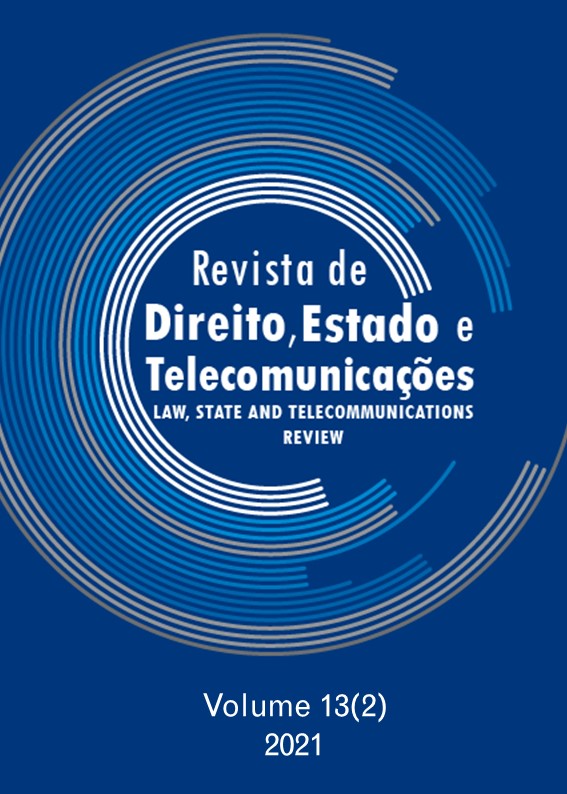General Data Protection Regulation (GDPR)
Legal, Ethic and Other Issues, Especially in Covid-19 Time
DOI:
https://doi.org/10.26512/lstr.v13i2.37425Keywords:
General Data Protection Regulation. Networked Privacy. Employee´s Rights. Telework. Covid-19.Abstract
[Purpose] This paper intends to present an academic analysis about the legal, ethic and other issues raised by the General Data Protection Regulation, especially in Covid-19 time. In this context, we present the main legal aspects of networked privacy, online privacy literacy, transparency, data integrity and others. Besides, we present the employee´s rights in the context of the Covid-19 pandemic, such as the right to erase data, temperature monitoring, the employee´s consent, the legitimation of the processing of personal data and body temperature control. We also give a word about data protection and teleworking. Our purpose is to contribute for the evolution of law, regarding the challenges and all the changes in our daily-life, provoked by the Covid-19 pandemic.
[Methodology] Our objectives are fundamentally achieved with a legal and doctrinal analysis, which is our methodology. The topics presented in this paper are linked between each other and this kind of joint treatment is our goal.
[Findings] Privacy is a broad concept that includes a set of personal characteristics that go beyond a user's name and location. Personal data includes the fundamental rights that privacy helps to guarantee. The GDPR is a legal basis for the processing of personal data, which is directly applicable in the European Union and does not require national transpositions. Employers are facing increasingly complex challenges in the day-to-day of their companies, given the need to stop the spread of coronavirus. To respond to the growing threat of coronavirus, many employers are considering monitoring the health of their employees to minimize the risk of infection and contagion in the workplace. Consent as a free, informed and unequivocal manifestation, required by the GDPR, collides with the existing asymmetries in the employment relationship. Despite all the difficulties in framing consent, it is unequivocal that the employment relationship requires the collection and processing of numerous employee data. It is an inevitability. Teleworking, provided from the employee's home, was one of the first measures adopted in the context of the pandemic caused by the Covid-19 disease. This type of work provision raises a number of questions regarding the protection of employees' personal data, namely in terms of control by the employer.
Downloads
References
AIDINLIS, S. The EU GDPR in Times of Crisis: COVID-19 and the Noble Dream of Europeanisation, Journal of European Consumer and Market Law 9 (4), 2020.
BETZING et. al. The impact of transparency on mobile privacy decision making. Eletronic Markets, 30, pp.607-625, 2020.
BOROCZ, I.; GKOTSOPOULOU, O. Between masks and curfews: Critical synopsis of the guidance issued by national supervisory authorities on analogue and digital body temperature measurement in the context of the COVID-19 pandemic in the EU, PinG 1/2021.
COMISSÃO NACIONAL DE PROTEÇÃO DE DADOS (CNPD). Orientações sobre o controlo à distância em regime de teletrabalho, Retrieved from: https://www.cnpd.pt/organizacoes/orientacoes-e-recomendacoes/trabalho/ on april 2021.
CRUTZEN, R., PETERS, G. J. Y. & MONDSCHEIN, C. F. Why and how we should care about the General Data Protection Regulation, Psychology & Health, 34:11, pp.1347-1357, 2019.
EUROPEAN DATA PROTECTION SUPERVISOR. Body temperature checks by EU institutions: Careful assessment and data protection safeguards are necessary, Retrieved from: https://edps.europa.eu/sites/edp/files/publication/01-09-20_edps_orientations_on_body_temperature_checks_in_the_context_of_euis_en.pdf on april 2021.
JONES, M. L. & ACKERMANN, K. Practicing privacy on other networks: network structures, economic arrangements, and identity strategies before cookies, Internet Histories, 2020.
KUMAR et. al. A wake-up call for data integrity invulnerability. Computer Fraud &Security, 2020.
MASUR, P. K. Online privacy literacy, self data protection and self- determination, 2020.
MONDSCHEIN, C.F., MONDA, C. The EU’s General Data Protection Regulation (GDPR) in a Research Context, in: Kubben P., Dumontier M., Dekker A. (eds.) Fundamentals of Clinical Data Science. Springer, 2019.
MOREIRA, T. C. Privacidade em tempos de pandemia. Covid e trabalho: o dia seguinte, in: Maria do Rosário Palma Ramalho e Teresa Coelho Moreira (eds.). Estudos Apodit 7, AAFDL Editora, Lisboa, 2020.
MOREIRA, T. C. Privacidade e proteção de dados pessoais em tempos de pandemia, in COVID-19, Implicações na Jurisdição do Trabalho e da Empresa, Coleção Formação Contínua, dezembro de 2020. Lisboa: Centro de Estudos Judiciários, 2020.
PINHEIRO, A. S. A COVID-19 e a proteção de dados pessoais, Observatório Almedina. Retrieved from: https://observatorio.almedina.net/index.php/2020/04/28/a-covid-19-e-a-protecao-de-dados-pessoais/ on april 2021.
SHABANI, M., GOFFIN, T., MERTES, H. Reporting, recording, and communication of COVID-19 cases in workplace: data protection as a moving target, Journal of Law and the Biosciences, Volume 7, Issue 1, January-June 2020.
SUDER, S. Processing employees’ personal data during the Covid-19 pandemic. European Labour Law Journal, 2021.nology for COVID-19 Prevention and Control in China: Lessons and Recommendations. Journal of Medical Internet Research 22 (10), 2020.
SVEC, M.; HORECKY, J.; MADLENAK, A. GDPR in labour relations - with or without the consent of the employee?, Ad Alta: Journal of Interdisciplinary Research, 2018, Vol. 8 Issue 2, p281-286.
WU, J.; WANG, J.; NICHOLAS, S.; MAITLAND, E.; FAN, Q. Application of Big Data Technology for COVID-19 Prevention and Control in China: Lessons and Recommendations. Journal of Medical Internet Research 22 (10), 2020.
Downloads
Published
How to Cite
Issue
Section
License
Copyright (c) 2021 Law, State and Telecommunications Review

This work is licensed under a Creative Commons Attribution 4.0 International License.
By submitting this paper to the Law, State and Telecommunications Review,
I hereby declare that I agree to the terms of the Creative Commons Attribution 4.0 International (CC BY 4.0).


